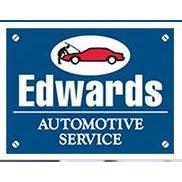We Are Open During The COVID-19 Crisis.
Open since 1914, Edward's Automotive Service is a AAA-approved and EnviroStars™ auto repair shop in Seattle, Washington, dedicated to providing prompt, friendly car maintenance services.
Call Us at: (206) 362-1960
Why do we call it a "tune up"? It's because the first ignition systems consisted of spark plugs and ignition coils, and as the coils worked they would emit a buzzing sound. If they were all working together correctly, they would all buzz at the same level and be “in tune.”
Although 1886 is credited with being the birth year of the modern automobile, did you know that the first gas gauge wasn’t installed until 1922?
Is there a rotten egg or sulfur odor coming from your engine? Its cause could be a faulty oxygen sensor, catalytic converter, PCV valve, or some other issue. Fortunately, it is an easily diagnosed and repaired problem.
Generally speaking, brake pads should be replaced at least every 30,000 miles, depending on the driving conditions. However, if you hear them squealing, it's time to replace them, no matter what the mileage.
How popular was the Ford Model T? Well, In 1916, 55% of all the cars in the world were Model T Fords. In fact, until 1958, almost 60% of all cars on the road in the U.S. were Fords. Then Ford introduced the Edsel...
Do you smell burning wires when you turn off your car's engine? In most cases, the problem is the battery cable, or a wire set is touching the hot engine. In either case, let us make the needed repair.
Here are a few words we take to heart when working with our customers: “The quality is remembered long after the price is forgotten.” - Sir Henry Royce
Do you drive a car or truck with a standard transmission? If you hear chattering when changing gears it can mean low or contaminated transmission fluid. Have it checked by a trained mechanic.
The cars of decades past are certainly less complex than what's available today. However, this doesn't mean that they're easier to fix. In fact, they may prove to be a serious challenge as there are no onboard computers that can tell mechanics exactly what's wrong.
When it comes to your vehicle, one thing that you'll have to pay close attention to is the state of your tires. Tire wear in particular is something to take note of because premature degradation can mean a camber alignment issue.
Changing the oil and filter regularly is one of the best ways to keep your car's engine healthy. The oil keeps your engine running smoothly by cutting down the friction.
Belts and hoses need to be inspected periodically. Look for cracks, fraying, sagging, and rips and tears, and have them replaced before they fail. Otherwise, your ride won't be going anywhere.
What's that noise? Chugging, rattling or humming sounds from the undercarriage could be your exhaust, transmission, wheel bearings or universal joints - all of which mean it's time to call a mechanic.
Signs of transmission problems include a feeling of "dragging" while the car is in motion. There may or may not be signs of a fluid leak. If you suspect transmission trouble, have the car towed to a repair shop.
We know that sometimes it's practically impossible to avoid hitting a pothole. If you do happen to slam into one, bring your car or truck in and have us check the wheels, tires, suspension system and alignment.
Do you drive a car with an automatic transmission? If it (the transmission) starts to slip while in gear, the transmission fluid could be low, need replacement, or the transmission bands may need to be tightened.
Asafa Powell, a famous Jamaican sprinter, once said: “I think about cars to try and distract myself. It's a good way to relax, take your mind off everything.”
Gas charged shocks improve ride performance by increasing the ability of the fluid in the shocks to do its job, improving the ride on rough roads, and increasing stability when cornering. They may be a better choice than heavy-duty shocks for passenger cars.
If you want to extend the life of your tires, avoid aggressive starts and stops. It not only prevents damage or wear and tear, but produces fewer emissions as well.
Transmission fluid is the most important component of your car’s automatic transmission. So if you notice low fluid or fluid leakage, it indicates that there may be some problem with the transmission.


